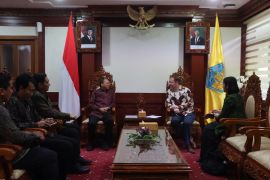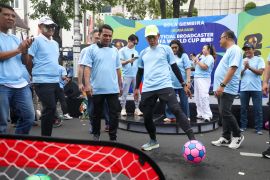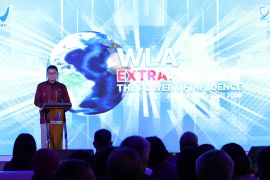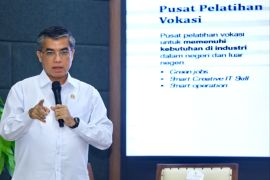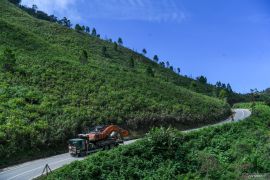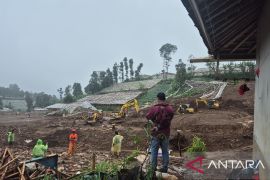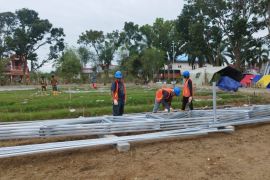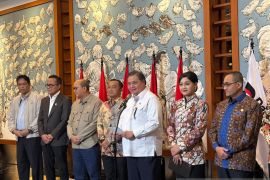According to the dean of Uncen`s Engineering Faculty, Dr.Agustinus Fatem, the university which is located in the easternmost province of Indonesia hplays a major role as a center for research on and development of renewable energy in the education sector in Papua province.
"Renewable energy is a sector which has become a global topic in efforts to tackle the world`s energy crisis and to address global warming issues. Academic activities at this campus are focusing on the sector," he said.
Agustinus added, the global issues have become the responsibility of the community in the entire world, including those who live in Papua. Therefore, the world`s efforts to overcome the problem of fossil fuel scarcity and environmental issues that have been affecting the globe should be followed up with concrete activities that can be started from campus.
"The development of renewable energy in Papua is done by studying the potential and its utilization, including developing the technology that can be applied in a practical and easy way with reasonable investment cost because the purpose of all these efforts is to meet the local people?s need of energy," Agustinus said.
Therefore, Papua, which has abundant potentials of a various types of renewable energy such as hydropower, solar energy, bio-fuels and wind energy, must have experts and skilled workers in that field. This is to optimize all the natural potentials in order to achieve the welfare for the local people in Papua.
Research
In connection with the academic activities on the renewable energy topic, the Faculty of Engineering has implemented several science and technology development programs involving the students and the lecturers.
According to the Deputy III to the Dean of the Faculty of Engineering, Apolo Safanpo, MT, a student team won the championship at the National Energy Conference of Indonesian Students (Kemin) held at the Bandung Institute of Technology (ITB) on 15 to 17 March 2009.
"In this activity, the students conducted a research on the processing of bintanggur fruits (Copillium inopillum) into alternative fuel and it was recognized as the best research by the jury consisting of experts," he explained.
In addition, some students at the final year in the Engineering Faculty, especially at the Electrical Engineering, are also directed to conduct research on renewable energy in accordance with their respective talents and interests.
"We drive and guide the students to conduct their final projects on the theme of renewable energy because it is very factual issues, in line with the international efforts to search and develop the utilization of alternative renewable energy sources," the head of the Electrical Engineering department, Joseph Lefaan, MT noted.
According to him, Papua which has a vast area stores very kinds of renewable energy potentials which are optimally unexplored. The research activities of students in the final project can support the efforts of all parties, particularly the local administration to develop those potentials.
Yosef said one of the students has made final project research titled The Identification of Hydro Power Potential To Develop Micro Hydro Power Plant in Drakisi Village, Demta Sub District, Jayapura District.
Some of the researches on renewable energy that have been and are being conducted by the Engineering Faculty lecturers include processing of sago and rice husk waste into bio-briquettes which aim to provide an alternative fuel for households, especially if kerosene as a main fuel is difficult to obtain.
In addition to research conducted by the Engineering Faculty lecturers, teachers at the Mathematics and Natural Sciences faculty (MIPA) has also produced some researches namely processing of bio-diesel from used cooking oil using zeolite catalysts, processing sago starch fermentation to ethanol using mobilized jelly and designa pyrolysis reactor to process the sawdust.
While in the development of hydropower potentials, a number of lecturers? researches have also been implemented, namely, those on the Study Potential of Micro Hydro Power Plant and The Distribution System in the North Coastal Area, Jayapura District.
Lectures
The efforts to produce competent human resources in the field of renewable energy is also done through lectures with the aim of giving students knowledge and expertise on the topic.
According to Agustinus, the Faculty of Engineering which has eight courses including those on Civil Engineering, Mechanical Electrical and Mining Engineering under the strata-one program and diploma-three program contains the subjects of renewable energy both as compulsory and optional subjects in the curriculum.
"The opening of the renewable energy subject in the Mining Department for instance, aims that the students gain general knowledge on this topic. As for students at the diploma-three level, renewable energy will become a compulsory subject and they will have expertise in this field," the head of the Mining department, Enos Karapa, MT explained.
This is supported by the results of assessment on the needs of a number of industry players who are hoping that there are experts and skilled workers in the field of renewable energy both as operators or energy equipment mechanics, the coordinator of Technical Working Group 6 at the University Co-operation division of CASINDO project (capacity development and strengthening for energy policy formulation and implementation of sustainable energy projects in Indonesia), Endang Hartiningsih, MT said.
Therefore, she continued, the industry players also supported any efforts, including the university to develop renewable energy in Papua for the dependence on foil fuel can be minimized.
"Thus, the job market for graduates who are competent in the field of renewable energy is widely opened," Endang said.
Cooperation program
To develop and enhance a variety of academic activities, particularly in the field of renewable energy, the Faculty of Engineering has worked with a number of institutions both within and outside the country.
One of the inter-university cooperation programs which is being implemented by the Engineering faculty in the field of renewable energy is CASINDO (capacity development and strengthening for energy policy formulation and implementation of sustainable energy projects in Indonesia).
The dean of the Engineering faculty, Dr.Agustinus explained, this activity is a cooperation between the Indonesian government with the Netherlands. Among a number of programs run in this activity is cooperation inter universities involving five higher education institutions throughout Indonesia.
In addition to Cendrawasih University in Papua, the four other universities are University of North Sumatra (North Sumatra), Diponegoro University (Central Java), Yogyakarta Muhammadiyah University (Yogyakarta) and University of Mataram (West Nusa Tenggara).
Together with the five universities, there is also a University of Technology Eindhoven (TU/e) as one of the partners in the development of renewable energy in the academic field.
"Developing renewable energy in Papua can be started from the university through research activities whose results can be used by the local administration for the development and industrial purposes as the energy users. Thus, there can be collaboration between these three components," a professor from TU/e, JMN van Kasteren PhD said while giving training materials on biomass in Jayapura, Papua, in mid-May.
The same opinion was also delivered by another TU/e professor, Dr.Jacob van Berkel who said Cendrawisih University play an important role to take the first step in the utilization of renewable energy in Papua.
"Even if the potential of renewable energy such as hydropower, to supply the electricity needs of the people in Papua, could be developed as a promising business when it collaborates with the state electricity company, PLN," he continued.
To optimize the utilization of renewable energy sources in Papua, the role of higher education alone will not sufficient. Synergy with the local administrations as policy and decision makers as well as the investors including the industrial sector, also take a significant role for the world`s efforts to overcome the crisis in energy supplies and to save the earth from pollution of fossil fuels in the hope it can be achieved as expected.
Producing competent human resources in the field of renewable energy will at least be a concrete step that has been taken and continued by Cendrawasih University which will continued in Papua.
(T.KR-LWA/HAJM/E002)
Editor: Priyambodo RH
Copyright © ANTARA 2011

